How To Reduce Test Anxiety
Part 3 of our Exam Stress Series
- Part 1: Why Do Exams Cause Stress?
- Part 2: How To Reduce Exam Stress with Physical Activity
- Part 3: How To Reduce Test Anxiety
Overcoming Test Anxiety #
Gain control of your anxious thoughts through self-care and skills practices during your final exams.
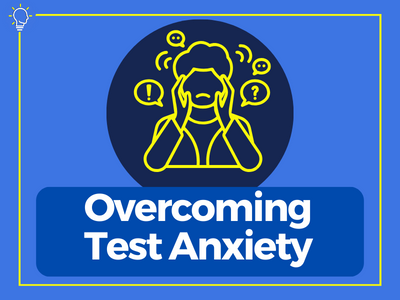
Contents
What is test anxiety? #
imply put, test anxiety is the combination of worry and self-doubt that, in addition to feeling miserable, can interfere with test-taking performance.
Who does test anxiety affect? #
Approximately 20%[1]-60%[2] of students experience test anxiety. Recently, in the ACHA-NCHA Spring 2023 survey[3], 36.9% of students self-reported anxiety as having a significant negative impact on their academics as a whole.
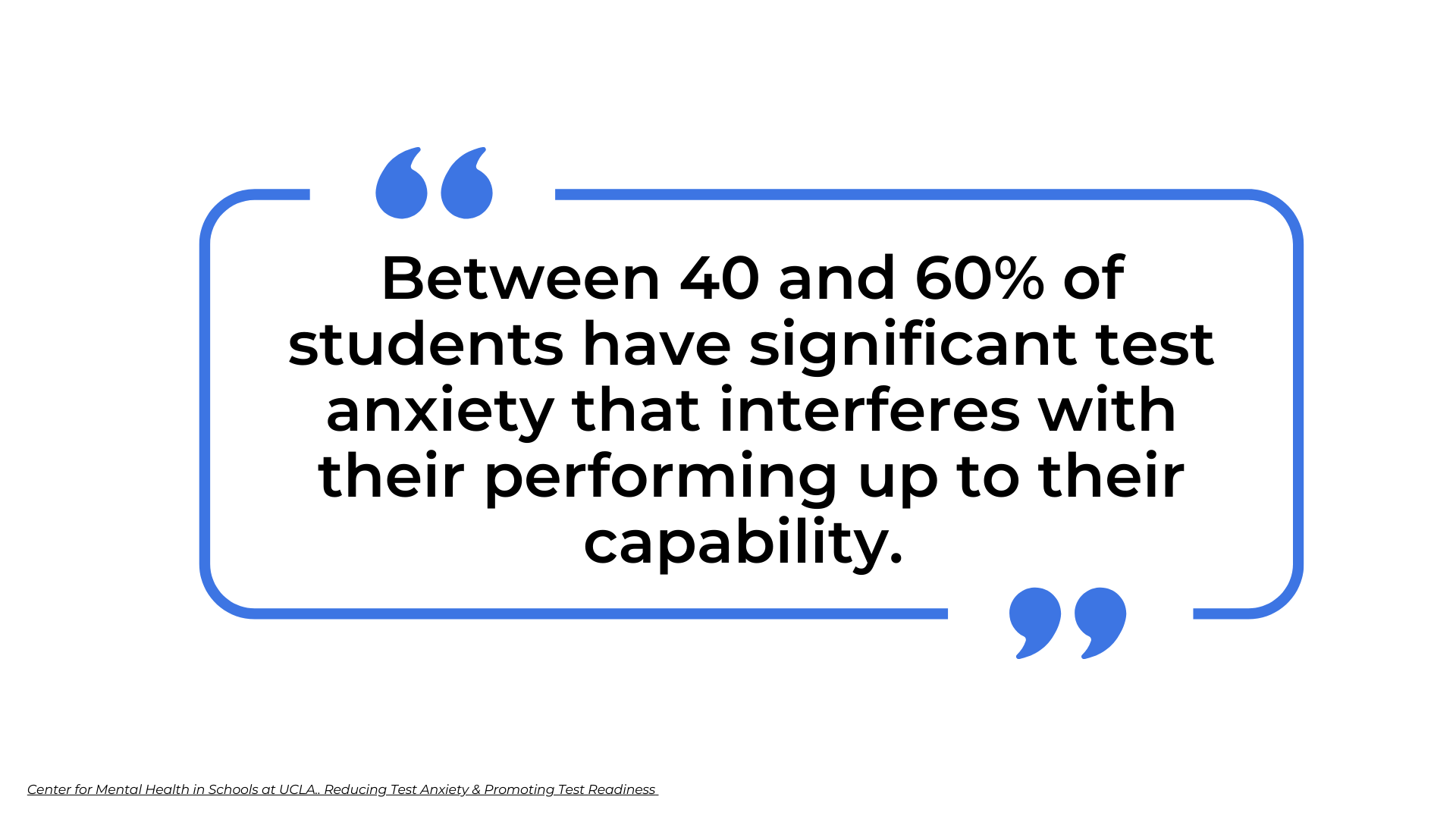
What are the effects of test anxiety? #
While there are debates about the extent and specific academic impacts of test anxiety on students, it is generally accepted that a high anxiety state impedes memory function and cognitive performance[4]. Looking at a specific study[1:1] exploring the connection between mental imagery and test-taking, 85.7% of the participants “rated the imageries as very or rather uncomfortable”. This same study also stated that students with test anxiety had higher rates of discomfort than their less anxious counterparts.
Since the fall of 2019[5] (Graph 1), anxiety has been reported as a top impediment to academic success among undergraduate students. Therefore, it is important to understand the internal and external factors that contribute to the impact of test anxiety on one’s test scores. Students who tend to be more goal-oriented, those who face an ambiguous academic task, passive learners, and those with a highly personalized study style feel the adverse effects of test anxiety more acutely than their fellow students[6]. A study[7] referenced in our first article displayed that students from lower socioeconomic backgrounds also tended to feel pressure and negative impacts from stress and test anxiety at higher rates. This challenge also impacts students on a holistic level, as there is evidence that the detrimental effects of test anxiety are not limited to the exam room, but rather, it negatively impacts the entire learning and studying process[8].
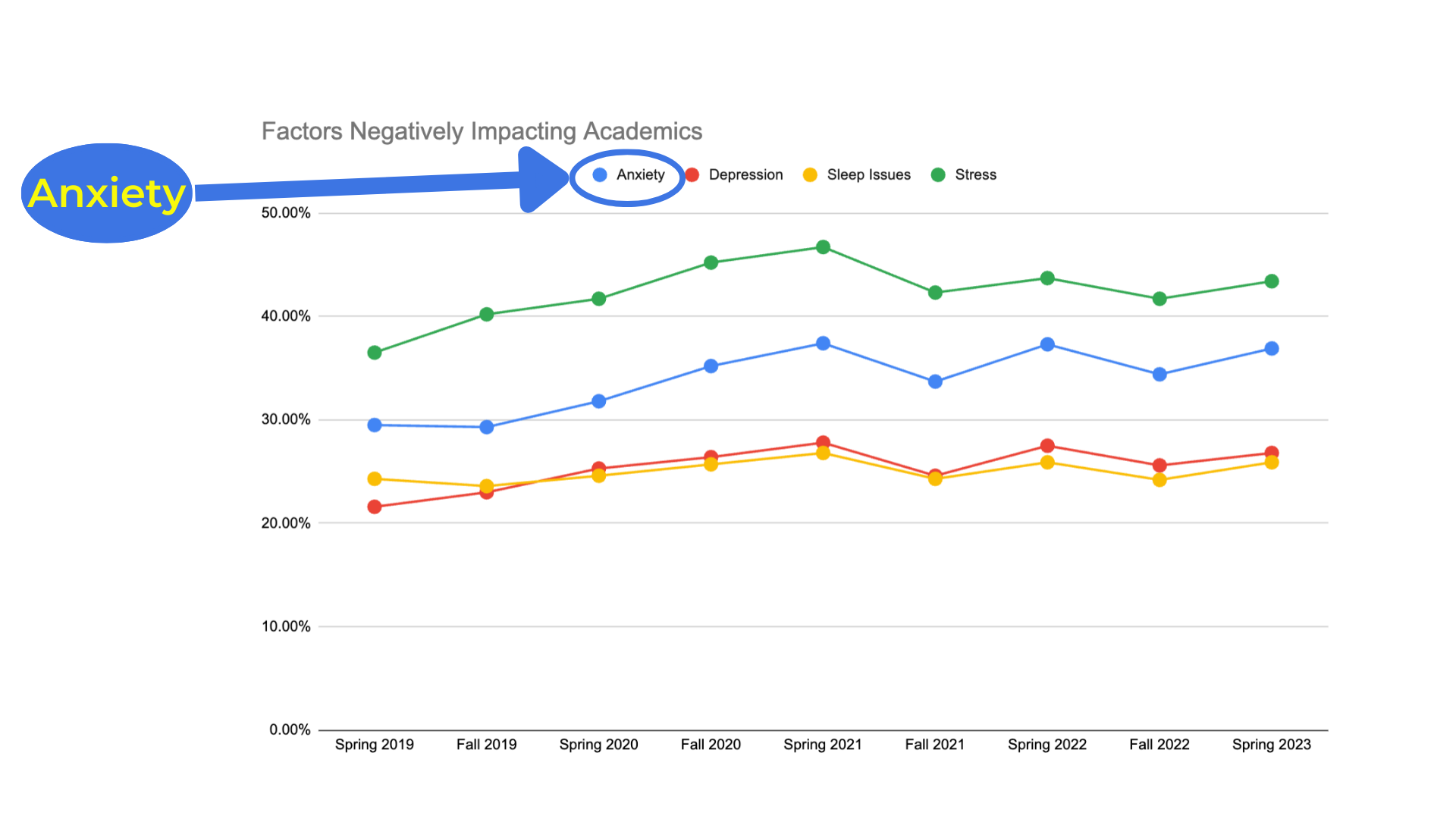
Anyone can experience test anxiety. Both external circumstances (current and past environment, long-term goals, current events, etc.) and internal factors (learning style, values, mental health, learning disabilities, etc.) can create challenges for students when the exam period arrives. Let’s now take a look at some MindLyte guides & activities that can help!
How To Cope with MindLyte #
It is important to address test anxiety and develop coping skills to mitigate this condition’s adverse effects. MindLyte has an entire guide dedicated to helping students with test anxiety, and you can use these activities to learn concrete techniques to take with you into your next exam.
Let’s highlight a few of the activities that can be particularly helpful:
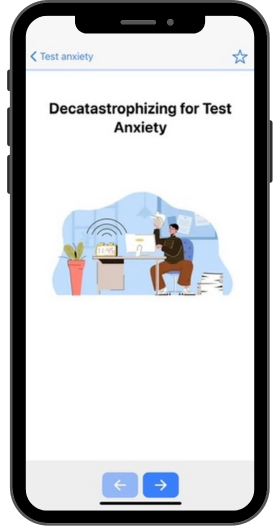
Decatastrophizing #
Catastrophizing is a common symptom of test anxiety. This is a type of cognitive distortion during which your mind goes to an exaggerated negative outcome and gets “stuck” there. With exams, catastrophic thinking can look like, “If I fail this exam my GPA will be ruined and then I’ll never get a good job after I graduate... if I even can graduate, since I’ll probably fail out”. This type of scary and unproductive thinking keeps you from being able to focus on your studies, overwhelms you while trying to complete concrete tasks, and keeps you in an overall heightened state of stress. Try decatastrophizing through the exercises on the MindLyte app. With practice, you can begin to correct your cognitive distortions and learn to lower the volume of catastrophic thoughts.
Study Tips for Test Anxiety #
Managing test anxiety begins with good study habits. When your mind and body are at an elevated level of stress, it is important to establish and follow a routine to feel less overwhelmed by your workload, to reduce the unknowns that breed anxiety, and to ensure that you have the best possible preparation for exam day. Prioritize self-care and mental wellness with these study techniques, ensuring your mind and body are fully equipped to perform academically. These tips can help you manage anxiety for a more effective and healthy test-taking period.
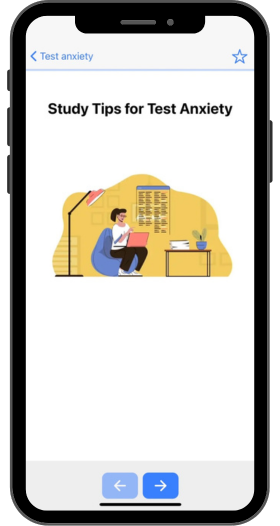
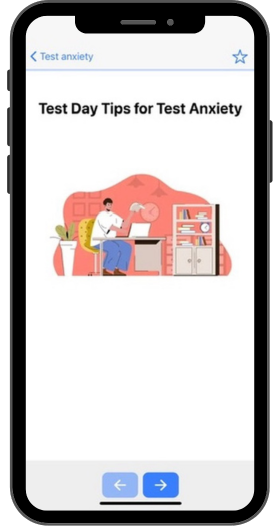
Test Day Tips #
Proper studying techniques can help reduce anxiety, but it is not a guaranteed solution to eliminate it. Regardless of preparation, test anxiety can linger or surprise you on the big day. The good news is, there are many methods to help reduce the potential negative effects of test anxiety. In this activity, learn to challenge distortions, explore positive self-talk, practice relaxation skills, and run through real-life test-taking strategies for exam day.
Final Thoughts #
Test anxiety can affect anyone, and various internal and external factors can amplify its negative effects. However, focusing on preparation, establishing a helpful routine, prioritizing self-care, and using some of MindLyte’s test day strategies can greatly reduce the negative impacts of test anxiety. Understand that you are not alone in this struggle and that there are many ways to manage anxiety so that the best version of you shows up on test day!
References
Maier, A., et al. (2021). The Association Between Test Anxiety, Self-Efficacy, and Mental Images Among University Students: Results From an Online Survey. Frontiers in Psychiatry, 12, 618108. ↩︎ ↩︎
Center for Mental Health in Schools at UCLA. (Year). Reducing Test Anxiety & Promoting Test Readiness. UCLA School of Mental Health Project. ↩︎
American College Health Association. ACHA-NCHA III Undergraduate Student Reference Group Executive Summary Spring 2023. American College Health Association, 2023. ↩︎
Tony Mowbray (2012). Working Memory, Test Anxiety and Effective Interventions: A Review. The Australian Educational and Developmental Psychologist, 29:2, 141-156, DOI: 10.1017/edp.2012.16 ↩︎
ACHA-NCHA III (Fall 2019-Spring 2023) American College Health Association. (n.d.). ACHA-NCHA Data: Publications and Reports. ↩︎
Cassady JC, Finch WH. Revealing Nuanced Relationships Among Cognitive Test Anxiety, Motivation, and Self-Regulation Through Curvilinear Analyses. Front Psychol. 2020 Jun 15;11:1141. ↩︎
Jennifer A. Heissel, et al. Testing, Stress, and Performance: How Students Respond Physiologically to High-Stakes Testing. Education Finance and Policy 2021; 16 (2): 183–208. doi: https://doi.org/10.1162/edfp_a_00306 ↩︎
Cassady, J. C. (2004). The influence of cognitive test anxiety across the learning–testing cycle. Learning and Instruction, 14(6), 569-592. https://doi.org/10.1016/j.learninstruc.2004.09.002 ↩︎